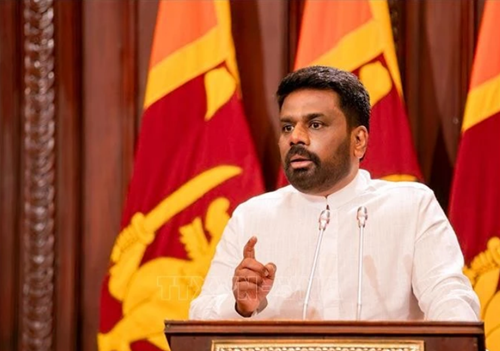In an interview with the Vietnam News Agency on the threshold of the visit, Tam stated that the visit, to be made at the invitation of State President Luong Cuong, will be the first by a Sri Lankan head of state to Vietnam in 16 years. This will be also the first trip to Vietnam by President Dissanayake since he took office in November 2024, demonstrating the special importance the Sri Lankan leadership places on the traditional friendship with the Southeast Asian country.
From Vietnam's perspective, the visit reaffirms the respect for Sri Lanka as a traditional friend and important partner in South Asia, Tam explained, stressing as the two countries are celebrating their 55th anniversary of diplomatic relations, this will be a good chance for them to reflect on the partnership and establish new directions for the relations in the new situation. The trip will feature various activities, covering the pillars of politics, economy and culture, with the highlight being high-level talks and meetings as well as signing of important cooperation documents.
    |
 |
|
Sri Lankan President Anura Kumara Dissanayake |
While staying in Vietnam, President Dissanayake will also participate as a guest of honor and speaker at the opening ceremony of the 20th United Nations Day of Vesak Celebrations in Ho Chi Minh City from May 6-8, demonstrating the deep Buddhist and cultural connections between the two countries.
The diplomat expressed her optimism about the future trajectory of bilateral ties, elaborating Vietnam and Sri Lanka have enjoyed robust traditional friendship, with Sri Lankan governments across different periods having prioritized strengthening and developing relations with Vietnam.
The two countries will promote cooperation in areas of their strengths such as agriculture, fisheries, culture, education, tourism, and Buddhism, based on existing cooperation documents and established mechanisms to achieve concrete and substantive results.
According to Tam, Vietnam and Sri Lanka will enhance collaboration in important areas that have recently been affected by external factors, including trade, investment, defense, security, people-to-people exchanges, manufacturing, heritage conservation, and information technology. Additionally, they will explore expanding cooperation in new fields like customs, pharmaceuticals, logistics, renewable energy, electronics, electric vehicles, archaeology, AI, e-commerce, digital economy, digital transformation, innovation, local cooperation, and air and maritime connectivity to broaden their cooperation space and adapt to regional and international situations.
The two countries will coordinate more closely and effectively at multilateral forums, especially the U.N., Non-Aligned Movement, and ASEAN Regional Forum as responsible partners, thereby enhancing the role and position of each country, she added.
Historical milestones and potential for growth
Reflecting on the diplomatic journey so far, Ambassador Tam traced the bilateral relations back to their consular ties set up in 1964 and the formal establishment of diplomatic relations in 1970. Despite historical upheavals, including periods when Vietnam had to temporarily close its embassy in Colombo, both countries have maintained regular exchanges of high-level visits and established institutional frameworks for cooperation.
Despite historical challenges, bilateral cooperation has flourished through regular high-level exchanges and institutional frameworks. President Ho Chi Minh visited Sri Lanka three times between 1911 and 1946, and today remains one of few foreign leaders honored with a statue in Colombo, Tam remarked.
Vietnam and Sri Lanka set up three key mechanisms at ministerial and deputy ministerial levels, and signed over 30 cooperation agreements spanning trade, defense, agriculture, culture, and education.
Despite remaining modest, two-way trade has been at a relatively stable level of around 300 million USD per year. Currently, Sri Lanka has about 30 projects in Vietnam with an investment capital of over 40 million USD. Culture, Buddhism, and people-to-people exchanges are becoming strengths and potential in the bilateral cooperation. Besides, the Vietnamese community in Sri Lanka is growing, currently numbering about 150, making contributions to the socio-economic development of the host country.
Ambassador Tam outlined several priority areas for strengthening bilateral cooperation. She advocated leveraging both countries' coastal positions to develop agriculture, fisheries, and ocean resources. With tourism representing another promising sector, Tam recommended direct flights and streamlined visa processes to boost cultural and spiritual tourism exchanges.
For trade advancement, she suggested joint ventures focused on third-country exports to reduce production cost, transport time, and tariffs, while urging free trade negotiations and improved connectivity to facilitate trade.
The ambassador also highlighted education and technology cooperation as essential for addressing shared challenges through research and innovation.
Renewable energy collaboration is a potential area, she said, adding solar and wind projects will not only strengthen the bilateral relationship but also contribute to addressing global challenges like climate change.
Source: VNA